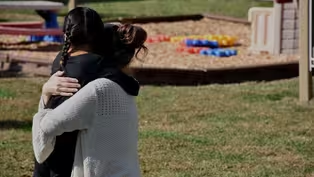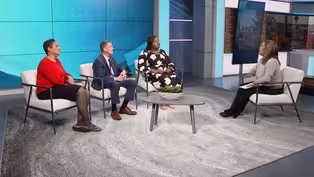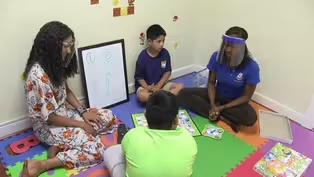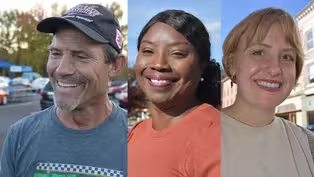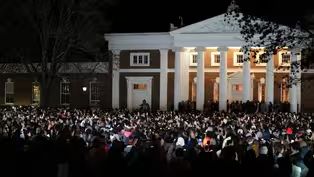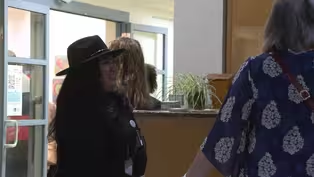VPM News Focal Point
Early Childhood Development | November 17, 2022
Season 1 Episode 16 | 26m 46sVideo has Closed Captions
Bilingual foster parents are needed; nurturing children; bilingual speech therapy
Bilingual foster parents are in short supply in Virginia; studies show a high risk of poor outcomes for those who do not receive proper care and nurturing during prenatal and formative years; a local business fills a need for speech therapy in English and Spanish.
Problems playing video? | Closed Captioning Feedback
Problems playing video? | Closed Captioning Feedback
VPM News Focal Point is a local public television program presented by VPM
The Estate of Mrs. Ann Lee Saunders Brown & Dominion Energy
VPM News Focal Point
Early Childhood Development | November 17, 2022
Season 1 Episode 16 | 26m 46sVideo has Closed Captions
Bilingual foster parents are in short supply in Virginia; studies show a high risk of poor outcomes for those who do not receive proper care and nurturing during prenatal and formative years; a local business fills a need for speech therapy in English and Spanish.
Problems playing video? | Closed Captioning Feedback
How to Watch VPM News Focal Point
VPM News Focal Point is available to stream on pbs.org and the free PBS App, available on iPhone, Apple TV, Android TV, Android smartphones, Amazon Fire TV, Amazon Fire Tablet, Roku, Samsung Smart TV, and Vizio.
Providing Support for PBS.org
Learn Moreabout PBS online sponsorshipANGIE MILES: Children are the future.
We hear this rather frequently, but do we fully grasp what it means?
If past is prologue, then to what extent does the quality of a person's childhood influence their future and our future?
Today, we explore the love, language, and learning needs, met and unmet, of early childhood and how those impact the world we all share.
You're watching "VPM News Focal Point."
Production funding for VPM News Focal Point is provided by Dominion Energy, dedicated to reliably delivering clean and renewable energy throughout Virginia.
Dominion Energy, Actions Speak Louder.
The estate of Mrs. Ann Lee Saunders Brown.
And by... ♪ ♪ ANGIE MILES: Welcome to "VPM News Focal Point."
I'm Angie Miles.
We turn our focus to early childhood today, some of the challenges and opportunities before us.
But first, Virginians are processing the aftermath of another tragic shooting at one of the Commonwealth's colleges.
Several University of Virginia student athletes were killed and several others injured by a fellow student Sunday night.
Adrienne McGibbon reports on some of the mental healthcare needs that often arise in the wake of a tragedy.
ADRIENNE MCGIBBON: Hundreds of UVA students gathered to mourn the deaths of classmates as they began to process the events that took place on the UVA campus this week.
This is yet another stressor that Virginia's college students are now coping with.
Dr. Jihad Aziz, the head of VCU's Counseling Services, says he's seen an uptick in the need for care.
DR. JIHAD AZIZ: We saw more students with significant mental health concerns, mostly around anxiety, depression and feeling isolated.
ADRIENNE MCGIBBON: Virginia's campuses increased support for students after traumatic events.
DR. JIHAD AZIZ: The challenge with a crisis is when it happens, what people do is seek their family and friends, and they might not need or want counseling.
It's what happens after that you really sort of see what the impact is.
ADRIENNE MCGIBBON: Journalist, Tom Kapsidelis, covered the mass shooting at Virginia Tech for the Richmond Times Dispatch.
In his book, "After Virginia Tech," he addressed how that event changed so many lives.
TOM KAPSIDELIS: What happens to people who were uninjured survivors?
People who know every bit of what happened at a particular shooting incident, but may not have been injured themselves.
They too carry those burdens forever.
ADRIENNE MCGIBBON: This fall, Virginia's community colleges and state universities launched a 24-hour Telemental healthcare service for students called TimelyCare.
UVA began the test pilot for this program last year.
ANGIE MILES: For parents concerned for their students, Dr. Aziz says an open dialogue is key and recommends seeking help if trauma begins to impact day-to-day behavior.
We need to disclose here that Tom Kapsidelis supervised a VPM News staff member when they both worked at the Richmond Times-Dispatch.
ANGIE MILES: As we began to take inventory of what young children need to be healthy and successful in life, we asked people of Virginia to weigh in.
MIKE: They need to be nurtured well, not only for physical growth but also for mental growth.
MEGAN TIERNAN: I think kids need a safe place to thrive.
And safety looks different for everyone.
But overall, you know, we know Maslow's hierarchy.
You know, they need a safe home, they need food, they need shelter, but what kids really need is emotional security.
TRENT CARSON: The worst thing in the world is a child that feels unloved, and then they need these role models to look up to, like we always had.
BARBARA FULCHER: It starts at home.
It starts when they're small.
You must have that connection with the family, with the mom, the dad, the aunt, the uncles, the siblings, along with the grandparents.
It starts working with them when they're children to have that warm, and comfort, and closeness for a family and stressing education and structure, must be a strong foundation.
MARIE IMOH: Reading to our kids, talking to our kids so that they learn those foundational blocks in terms of having dialogue and being able to read and do other things as they grow older.
ANGIE MILES: We also asked people whether they believe most young children are receiving what they need to thrive.
Everyone said no.
Another need, more foster care parents.
There are more than 5,000 children in foster care in Virginia and a great need for more bilingual foster parents.
Keyris Manzanares has that report.
KEYRIS MANZANARES: Commonwealth Catholic Charities runs foster care services in Northern Virginia, Richmond, and Roanoke.
Chief Operating Officer Anita Wallen says there's a critical need for foster parents who speak languages other than English.
ANITA WALLEN: I think I can count on one hand how many foster parents we have that are bilingual, especially in Spanish.
And we do serve quite a bit of children who are Spanish speaking.
KEYRIS MANZANARES: CCC not only caters to children in the domestic foster care system, but also those who come to the United States as unaccompanied refugees.
ANITA WALLEN: And these are children who are under the age of 18, but have left their home country and arrived here with no other forms of support.
They do not have any family here.
They do not have any resources they can depend on, so they're entirely dependent on us.
So, the children come from everywhere.
They, from Central America, from Africa.
We have children who have come from Asia.
So they stay with us till they turn 21.
KEYRIS MANZANARES: Jeneba Kone went into CCC's care after she arrived as a refugee from Liberia in 2015.
She wasn't placed in a bilingual household.
She says communication would've been easier if she was.
JENEBA KONE: If they were bilingual.
I think some things will have been different than it was, you know what I mean?
Because if you are bilingual and you come from somewhere else, you're going to understand exactly what that person, the other person is going through.
KEYRIS MANZANARES: Kone says her bonus parents have worked hard to connect with her.
JENEBA KONE: They accept me for who I am.
And they respect my holidays.
They celebrate with me.
KEYRIS MANZANARES: Melisa Bates works for CCC and is dedicated to recruiting families of all backgrounds to fill in the gaps.
MELISA BATES: We have such a, a diverse group of children from all over the world.
We have, we're one of the few programs in state of Virginia that do international foster care.
And so these children, English is not their first language.
And we do need families who, if they would speak their language, ideally that would be great.
Many speak Spanish, but there are also other languages that if they spoke another language that would be welcomed as well.
KEYRIS MANZANARES: To start the conversation about fostering, CCC holds recruiting events that Bates says brings them closer to reaching potential bonus parents.
MELISA BATES: It's hard being in foster care, first of all.
It's very hard for these youth to be in a new setting in a new country.
And if they could have the opportunity to be connected with a foster family that was able to communicate with them in their language, I feel it would be really beneficial for the youth to adapt and understand a little more easier.
KEYRIS MANZANARES: Adrienne Lambert has been a foster mom under CCC for the last 18 years.
In that time, she's fostered 14 international children, her latest being from Haiti.
ADRIENNE LAMBERT: He came with his little Haitian Creole dictionary.
It was a picture dictionary.
So we would sit and chat about different words.
I like to remember words that sound a lot like English.
So he was sharing with all the little words.
And then of course, by the end of our little session each day, I still couldn't say a word in Creole.
Other than bonjour in French, because he does speak French, Creole, Spanish, and now English.
So, he's got me beat and he's only been in the country probably three years.
KEYRIS MANZANARES: Lambert says although she hasn't picked up a second language, she's been able to provide a loving home.
ADRIENNE LAMBERT: Children can read your vibes.
As long as you're smiling, and there's love, and they feel like they can trust you right away, you really don't have to have a lot of language.
Just a lot of love and compassion is what you really need.
ANGIE MILES: If you're curious about foster care or want to take the first step, Commonwealth Catholic Charities is always encouraging people to get involved.
You can learn more at vpm.org/focalpoint.
VPM News Focal Point is interested in the points of view of Virginians.
To hear more from your Virginia neighbors, and to share your own thoughts and story ideas, find us online at vpm.org/focalpoint.
ANGIE MILES: In the annual KIDS COUNT Data survey by the Annie E. Casey Foundation, Virginia's children fared better than the national average in economic wellbeing, but worse on measures of health, including more low birth weight babies in our state.
What is it that kids need most to flourish, and how can we best meet their needs?
ANTHONY GITALADO: Ready, steady Go.
Hello.
ANGIE MILES: Anthony Gitalado is father of two young children.
ANTHONY GITALADO: I spend a lot of intimate time with my son and also my daughter too to get that positive reinforcement that I so desired to get.
I think the easiest way to sum it up is to end that vicious toxic cycle.
ANGIE MILES: His determination to nurture them well is prompted in part by his own childhood, which he describes as full of traumatic experiences as an unwanted stepchild until his mother eventually abandoned him.
ANTHONY GITALADO: They say childhood is supposed to be your fondest memory however, I grew up in a very turbulent family where my mom was always trying to push me off to her her friends, which ultimately led to foster care.
ANGIE MILES: Because of his upbringing, the college graduate and IT professional says, he's had to look elsewhere for role models.
One person he admires is this man, who like Gitalado comes from a family of recent immigrants.
When Wes Moore became the first black man in Maryland and only the third in the country to win a governorship it wasn't the first time he'd drawn national attention.
Moore wrote the 2010 bestseller "The Other Wes Moore".
This dual biography featured two boys, same race, same name, similar humble beginnings.
The book illustrates what a difference the right opportunities and support can make in how children grow up.
CHILD 1: When I grow up I want to be a firefighter.
CHILD 2: Me when I grow up I want to be a teacher.
CHILD 3: A princess.
CHILD 4: My mom.
ANGIE MILES: You want to be your mom?
CHILD 4: Yeah.
ANGIE MILES: Ask young children their hopes for the future and their answers might surprise you.
CHILD 5: I want to be a doctor.
CHILD 6: I want to be a sheriff cop.
ANGIE MILES: No child hopes for endless disappointments, failure or prison.
So why then does this become the reality for so many people?
KIMBERLY AYERS: Not having a sense of safety, not having a sense of where's my next meal going to come from?
Where am I going to sleep?
Who is going to take care of me?
Are mom and dad going to be fighting tonight?
Am I going to be scared?
I mean, those are all things that are very real matters that that occur with children and that does affect our brain development.
And you know how we see the rest of our world.
ANGIE MILES: Kimberly Ayers is describing the kinds of experiences that can traumatize young children and put them on a course for lifelong struggle.
The more significant the trauma the greater the risk for future failure.
The groundbreaking book "Ghosts from the Nursery" suggests a straight line from poor prenatal care and disjointed or abusive relationships in infancy to maladjusted behavior by preschool.
The research shows the prevalence of disease, violence and crime in today's society is tied directly to inadequate support of parents and very young children.
KIMBERLY AYERS: Unfortunately, a lot of what we see in social services is generational and it's incumbent upon us to provide services and support to families that are at high risk.
The child was born substance exposed or the child was born to a parent that was incarcerated or the child entered foster care upon birth or soon thereafter.
REBECCA MORGAN: So brain growth and development in those first two years of life as children are learning how to interact with the world, that is the basis for all of the other academics and all of the other connections and relationships they form later in life.
ANGIE MILES: Rebecca Morgan of Middlesex County is president of the Virginia League of Social Services Executives.
Her county offers Head Start for children three to five and Early Head Start for infants and toddlers.
REBECCA MORGAN: Making an investment now into their future is only going to strengthen our whole society and it's going to benefit all of us.
ANGIE MILES: Head Start is a federal program begun in 1965 to promote school readiness.
Elisa Riis is Head Start director for Frederick Clark in Winchester, like all Head Start programs this preschool experience is income based intended for the poorest among us.
Her program serves children and supports their parents as well, many of whom are immigrants.
ELISA RIIS: So a parent might need help driving, getting a license so we'll help through that process.
Or they might be wanting to buy a house.
And so we can help them start with getting a bank account and then building some credit and moving towards their goal, whatever it may be.
TEACHER: Okay, Cervando, do you have your lunch?
Yes.
ANGIE MILES: Riis has special concerns about children born during and just before the pandemic, because so many were deprived of social interaction in preschool and because mask wearing made it hard for children to see facial movements crucial for emotional connection and for learning language.
ELISA RIIS: Phones and technology also been a big impact.
There's two year olds that are better on their phone than I am, and it's become a babysitter.
They lose out on that personal conversing socialization falls into it.
There's just so much that's lost.
And I think from the pandemic, it's really even worse.
TEACHER 2: Upside down, upside down.
STUDENT: Upside down.
TEACHER 2: Is it hard to sit upside down?
ANGIE MILES: Riis and her team strive to ask open-ended questions to build critical thinking skills to discipline in a productive and respectful way.
And mostly to constantly assure the children that they are safe and they are loved.
These early school interactions are the focus of Bweikia Steen's research and teaching at George Mason University.
BWEIKIA STEEN: You got it, you got it.
Emotion drives what?
STUDENTS: Attention.
BWEIKIA STEEN: Attention drives.
STUDENTS: Learning.
BWEIKIA STEEN: So what is the child's interests?
What are their strengths?
How do do we develop a rapport with each child?
How do we use.
What happens in the home matters, and what happens in utero matters.
But I also think that it can be countered with what happens in the school, whether that's as an infant, a toddler.
Pre-K, the school plays a major role in development and learning of that child.
Intentional teachers, teachers who won't give up will determine best strategies to develop relationships with students.
Early childhood is the time to meet the needs of the students.
Birth to three years old, that's the window of opportunity for learning and development.
Early childhood educators are the most important educators.
They lay the foundation for whether a child decides that school is for them.
For me, my research says that is determined by first grade.
ANGIE MILES: Another groundbreaking book "The Untouched Key" runs parallel to Steen's findings.
The negative effects of trauma can be countered to some degree by the intervention of caring adults.
That was the case for Anthony Gitalado.
He says years of neglect shaped him into a troubled youth.
He spent almost a decade in foster care after being left at a crisis center.
ANTHONY GITALADO: Freshman year of high school, I was an arguing with my mom.
She took me to, said get in a car.
Took me to Westhaven Crisis Center in Virginia Beach dropped me off and and that was the last time pretty much I saw her aside from court.
ANGIE MILES: Gitalado offers praise for the social workers who intervened to help him.
There was one in particular who made sure he finished college.
He later lobbied his local legislator to recognize her dedication with a formal resolution.
Gitalado didn't find his guardian angel until he was a teen.
Experts agree that while it may never be too late to make the difference a young person needs, the sooner the intervention, the better.
Bweikia Steen's colleague at GMU, Colleen Vesely says America continues to undervalue young children and those who care for them.
COLLEEN VESELY: Those folks who are working with infants and toddlers, they have to be our best and brightest.
We have to decide as a society, “Are children important?
” Then we put policies in place that truly support those early years.
And those are things that are directly supportive of children, but also those adult caregivers around them whether that be their parents, their grandparents, their neighbors, their teachers, right, their coaches, all of those people that contribute to their development.
ANGIE MILES: Since 2020, childcare has lost more than 100,000 workers, continuing a trend of attrition prompted by long hours and low pay.
COLLEEN VESELY: They're not trusting that they actually have degrees and expertise and know how to guide young children.
And so there just seems to be this pervasive kind of lack of respect for those earliest years as being really important.
ANGIE MILES: The experts here point out that income is not the only factor in determining a child's wellbeing.
Many families with limited resources provide nurturing and enriching experiences for their children.
Many affluent families can be neglectful.
Professor Vesely says the current care crisis is an opportunity for leaders to align their stated values with policies and actions.
We spoke with professionals who work directly with young children to gauge the needs of Virginia's youth and learn how to assist in their development.
Here's a clip from that conversation.
ANGIE MILES: Many young children are really not having their needs met, there's more we can do.
Lisa, would you tell us a little bit more about the scope of the problem?
LISA THOMPSON: I would like to focus for a moment just on infant and toddlers.
And so, for 2 1/2, 3 years of their early lives, they saw most of their caregivers wearing a mask, and because of that mask, we know that many children who are nonverbal, they rely on facial expressions, and so, we have seen a gap.
ANGIE MILES: What kinds of things are being done though to help care providers to span the distance of that gap?
LISA THOMPSON: So, in the State of Virginia, there's a program called Virginia Quality Birth to Five where we are really focusing on teacher-child interactions.
It's a tool that is being used called CLASS, and that tool really focuses in on making sure that all teachers are engaging in authentic, real conversations with children.
ANGIE MILES: How about VAAEYC, what kinds of things are you doing to support the care providers as they're interacting with children?
DELYSIA RIDDICK: VAAEYC makes sure to partner with the Virginia Department of Education and other local organizations to train and have opportunities for CLASS like tutorials and making it readily available for providers.
ANGIE MILES: What else do very young children need that maybe we need to focus on more as a society ensuring that they get?
LISA THOMPSON: All children need someone to be their advocate and be their biggest cheerleader, and I think that's the one thing that Virginia children need the most.
ANGIE MILES: We don't have enough workers, and that's true in childcare, it's true across many industries, it is especially true in childcare.
Clark, can you talk a little bit about that as an owner?
CLARK ANDRS: I've been doing this for 33 years and I've never seen anything like it.
It is so difficult to hire teachers.
And limited number of staff, you have to be creative in how you are able to still care for the children that you currently have enrolled.
You can watch the full interview on our website ANGIE MILES: Speech therapy improve their verbal communication skills so they can express themselves and be better understood.
There are fewer than 100 speech therapists statewide who cater to kids whose first language is not English.
Keyris Manzanares introduces us to a Richmond practice specializing in Spanish speech therapy.
(Tia speaking foreign language) TIA JAVIER: The reason that I became a speech therapist was because my three-year-old at the time, I was not able to understand what she was saying, so she needed a speech therapist.
And since we speak Spanish at home, I was looking for a Spanish-speaking speech therapist, but there were none in Richmond.
And through my research, I found that there were only 91 Spanish-speaking speech therapists in the entire state of Virginia.
TEACHER: What do we do?
STUDENT 1: Spin.
TIA JAVIER: Good job, good job.
Before studying to become a speech therapist, I was a Spanish professor and decided to study speech therapy so that I could fill this gap.
I know that Richmond has a very large Hispanic population.
I was born and raised in Richmond, so I'm familiar with the community, and I know that these types of services are needed.
TEACHER: Mask.
STUDENT 2: Mask.
TIA JAVIER: Good job.
Yeah, that was a really good one.
My business is Bilinguatherapy, and it's a speech therapy and occupational therapy practice, and we offer and specialize in therapy in Spanish.
This is my community that I'm from, and I feel very invested in it, so to be able to help so many people from so many different places, it really fulfills me.
And not only that, but these are children who are not able to communicate with their own families, with their moms and their dads.
(client speaking foreign language) TIA JAVIER: The majority of my patients are between the ages of one and five, so these are little kids, and our sessions are usually play-based.
They think that they're playing, but in reality, we're doing skilled speech therapy.
STUDENT 2: My turn.
TEACHERS: Good job.
A lot of these kids, they are frustrated.
They want to communicate with their family, but they can't.
So once they get that communication, that makes them more confident, it makes them more sociable with others, it makes them just a more happy person.
TIA JAVIER: Ssss.
STUDENTS: Spin.
TEACHER: Good job.
TIA JAVIER: Very good.
TIA JAVIER: Someone who doesn't have early intervention in speech therapy, it can affect their academics, it can affect their social life, it can affect them as an adult.
Look, it's Abby's turn.
I've never met a stranger, so to me, everyone is like family, and the way that you feel about family, you would want them to be successful and help them.
So to know that these kids cannot communicate, my heart goes out to them, and then to be able to see them and to see their progress, and I'll have some kids here that are like four and five years old who can't speak to their own parents, but after a few months of therapy, they're saying hi, they're using sentences, and that's just a beautiful thing just to see their life change like that.
STUDENT 2: Four.
TEACHER: Good job.
TIA JAVIER: Good job.
ANGIE MILES: In addition to Spanish speakers, Bilinguatherapy also helps those who speak in a range of linguistic styles, including African American Vernacular English.
What are young Virginians most urgent needs in your view and how can we best support them?
We hope we've offered some ideas and we invite you to learn more and access resources on our website, vpm.org/focalpoint.
Thank you for watching.
We'll see you next time.
Production funding for VPM News Focal Point is provided by Dominion Energy, dedicated to reliably delivering clean and renewable energy throughout Virginia.
Dominion Energy, Actions Speak Louder.
The estate of Mrs. Ann Lee Saunders Brown.
And by... ♪ ♪
Childcare faces unprecedented challenges
Video has Closed Captions
Clip: S1 Ep16 | 8m 57s | Meeting the needs of young children is difficult with so few workers (8m 57s)
In Focus | Clark Andrs, Delysia Riddick & Lisa Thompson
Video has Closed Captions
Clip: S1 Ep16 | 13m 18s | What extent does the quality of a childhood influence their future...and our future? (13m 18s)
Bilinguatherapy makes speech therapy accessible to Richmond
Video has Closed Captions
Clip: S1 Ep16 | 3m 2s | Bilinguatherapy is a speech and occupational therapy practice founded by Tia Javier in Ric (3m 2s)
Childhood Development | People of Virginia
Video has Closed Captions
Clip: S1 Ep16 | 1m 7s | We asked Virginians what they felt was vital to healthy early childhood development. (1m 7s)
Managing mental health after deadly UVA shooting
Video has Closed Captions
Clip: S1 Ep16 | 1m 28s | Mental health care providers at UVA help victims who aren’t suffering from physical wounds (1m 28s)
Need for bilingual foster parents
Video has Closed Captions
Clip: S1 Ep16 | 4m 2s | Commonwealth Catholic Charities in need of bilingual foster parents (4m 2s)
Providing Support for PBS.org
Learn Moreabout PBS online sponsorship
- News and Public Affairs

Top journalists deliver compelling original analysis of the hour's headlines.

- News and Public Affairs

FRONTLINE is investigative journalism that questions, explains and changes our world.












Support for PBS provided by:
VPM News Focal Point is a local public television program presented by VPM
The Estate of Mrs. Ann Lee Saunders Brown & Dominion Energy
